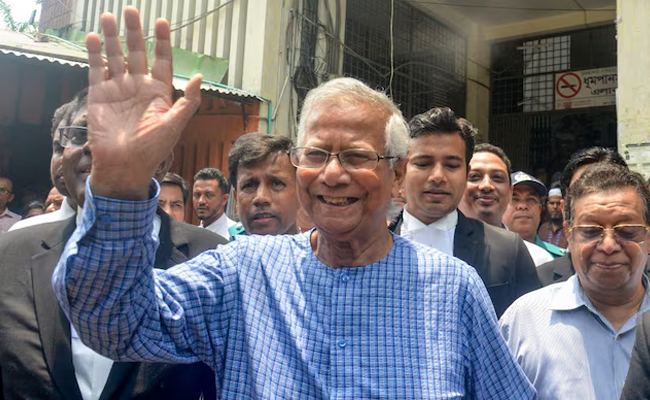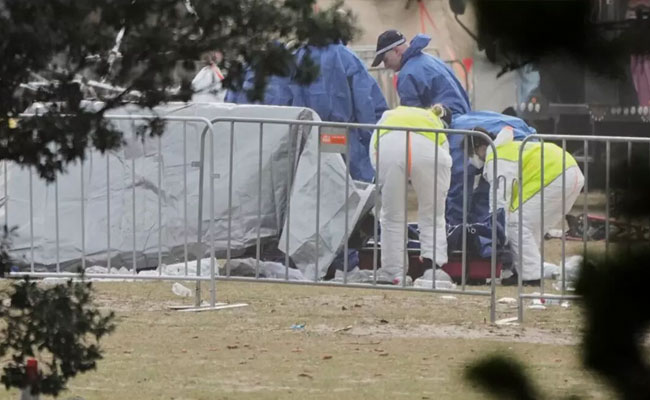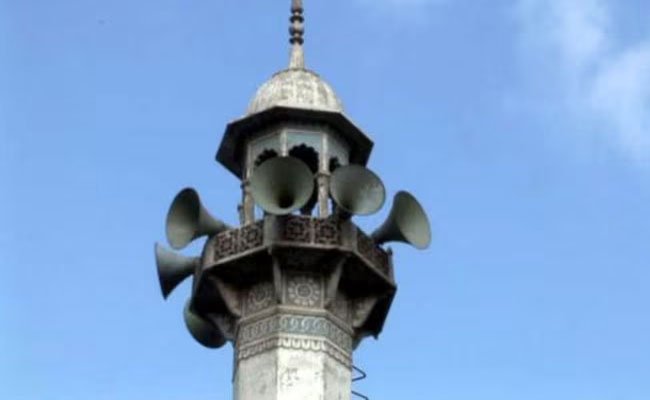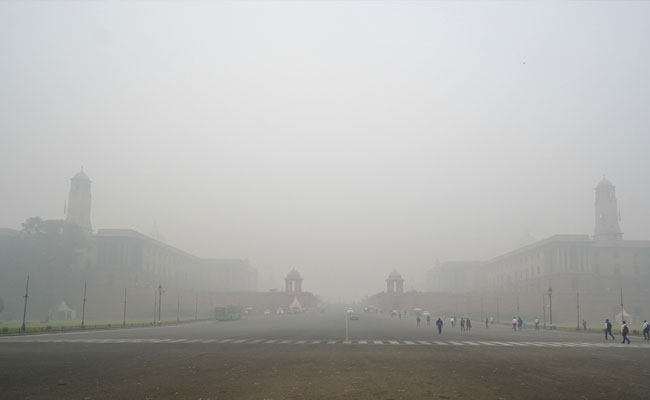Dhaka (PTI): Bangladesh President Mohammed Shahabuddin dissolved Parliament on Tuesday and appointed Nobel laureate Mohammad Yunus as the head of an interim government, a day after Prime Minister Sheikh Hasina abruptly resigned and fled the country following weeks of violent protests.
The decision was made in a meeting President Shahabuddin had with chiefs of the three services and a 13-member delegation of the Anti-Discrimination Student Movement at Bangabhaban (presidential palace), President's Press Secretary Md. Joynal Abedin said late Tuesday night.
The other members of the interim government will be finalised after consultations with various political parties, the president's press secretary said.
While the Army took charge on Monday, incidents of violence were reported overnight in many parts of the country and the death toll due to the unrest since mid-July rose to 440.
A number of Hindu temples, households and businesses were vandalised, women assaulted and at least two Hindu leaders affiliated with the Awami League party headed by Hasina were killed in the violence in Bangladesh after she fled the country, according to two community leaders in Dhaka.
The Anti-Discrimination Student Movement that spearheaded the massive protests has earlier said that 84-year-old Yunus had agreed to head the interim government.
Yunus is currently out of the country but welcomed the ouster of Sheikh Hasina’s regime, describing the development as the “second liberation" of the country.
Yunus won the Nobel Peace Prize in 2006 for his anti-poverty campaign through the Grameen Bank, a model replicated across continents.
Hasina landed at the Hindon airbase, near Delhi, on Monday in a Bangladesh military aircraft and is unlikely to move out of India for the next couple of days, people familiar with the matter said in New Delhi. She has been shifted to an unspecified location under tight security, they said.
With army and police personnel patrolling the streets, the situation in Dhaka was largely calm on Tuesday, local media reported.
Buses and other public transport were on the streets and traders were opening shops. Government vehicles were heading to offices. Many battery-run rickshaws plied the roads, it added.
According to local media, 100 more deaths in the Monday violence were reported taking the toll to 440. “The death toll(in the violence) stood at 440 in 21 days from July 16 to yesterday,” the Prothom Alo said.
The President's move to dissolve Parliament has cleared the way for fresh elections, just months after the January polls which brought Hasina to power again for the fourth consecutive term. The opposition had then boycotted the polls.
"The President dissolved the Jatiya Sangsad (Parliament) under an executive order," a Bangabhaban spokesman told PTI.
"The decision to dissolve the Parliament was taken following the President's discussions with chiefs of three staff of armed forces, leaders of different political parties, representatives of civil society and leaders of the Anti-Discrimination Student Movement," said a statement issued by the President's office, even as a major reshuffle was carried out in the top positions in the Army.
In a video posted on social media early Tuesday, Nahid Islam, one of the key coordinators of the student movement, proposed Yunus as the head of the interim government.
He said they have already talked with Yunus, who has agreed to take the "responsibility to save Bangladesh".
"No government other than the one proposed by the students will be accepted. As we have said, no military government, or one backed by the military, or a government of fascists, will be accepted," said Nahid, flanked by two other coordinators.
Yunus has agreed to lead the interim government as its chief adviser, the Daily Star reported, citing a source.
"If the students can sacrifice so much, if the people of the country can sacrifice so much, then I also have some responsibility. Then I told the students that I can take the responsibility," Yunus said.
Yunus had been locked in a protracted row with the Hasina government due to obscure reasons while authorities initiated a series of investigations against him after she came to power in 2008. He was charged under dozens of cases. In January, Yunus was sentenced to six months in jail by a court on charges of labour law violation.
Meanwhile, Bangladesh Nationalist Party (BNP) chief and ex-premier Khaleda Zia was released from house arrest, according to the Presidential spokesman. The 79-year-old former prime minister has long battled various ailments, including issues related to the kidney, lung and heart.
The process to free those arrested Since July 1 has started, and many have already been released, he added.
Fresh clashes between protesters demanding Hasina's resignation over the quota system in government jobs and the ruling Awami League supporters in different parts of Bangladesh erupted on Sunday days after more than 200 people were killed in violent clashes between police and mostly student protesters in July.
At least 24 people were burnt alive last night in a hotel owned by a leader of the Awami League in the western Joshor district, hospital sources said.
The educational institutions were reopened on Tuesday following a long period of closure due to violence surrounding the student movement. However, the educational institutions in Dhaka saw low attendance, the Dhaka Tribune newspaper reported.
Attendance in the ministry offices was significantly low, and ministers and Members of Parliament were notably absent. Those who did come to work were filled with fear and anxiety, it added.
Army members also were seen on duty alongside police officers at the Home Ministry office.
Let the Truth be known. If you read VB and like VB, please be a VB Supporter and Help us deliver the Truth to one and all.
Hyderabad/Melbourne (PTI): Sajid Akram, the 50-year-old slain suspect in a mass shooting at a Hanukkah celebration at Bondi Beach in Australia, was an Indian citizen hailing from Hyderabad, Telangana Police revealed on Tuesday.
While he had migrated to Australia 27 years ago, Akram carried an Indian passport. Akram, along with his 24-year-old son Naveed Akram, recently travelled to the Philippines on an Indian passport.
Akram, one of the two suspects in the mass shooting that has left 15 people dead and dozens injured, migrated to Australia in 1998 and had limited contact with his family here since then, the Telangana DGP's office said in a statement.
"Sajid Akram (50) is originally from Hyderabad, India. He completed his B.Com degree in Hyderabad and migrated to Australia in search of employment, approximately 27 years ago, in November 1998," it said.
ALSO READ: BJP accuses Karnataka govt of 'failing' to prevent noise pollution caused by 'azaan'
He married a European-origin woman before settling permanently in Australia. The couple have one son, Naveed (the second suspect who is in custody at a hospital in Australia) and one daughter, it said.
Naveed and Akram's daughter were born in Australia and are citizens of that country, the statement said.
On Tuesday, Australian Federal Police Commissioner Krissy Barrett described the mass shooting as "a terrorist attack inspired by the Islamic State."
According to Australian authorities, the suspects were a father and son, aged 50 and 24. The older man, who was identified as Sajid Akram, was shot dead.
The Telangana police said Akram visited India on six occasions after migrating to Australia, primarily for family-related reasons such as property matters and to meet his elderly parents.
It is understood that he did not travel to India even at the time of his father's demise, the statement said.
The family members have further expressed no knowledge of his radical mindset or activities, nor of the circumstances that led to his radicalisation, police said.
"The factors that led to the radicalisation of Sajid Akram and his son, Naveed, appear to have no connection with India or any local influence in Telangana," Telangana police said.
Telangana Police further said it has no adverse record against Akram during his stay in India before his departure in 1998.
The state police said it remains committed to cooperating with central agencies and other counterparts, as and when required, and urged the public and media to avoid speculation or attribution without verified facts.
Quoting security sources, Australia's ABC News reported that Akram and Naveed travelled to the Philippines to receive "military-style training".
"Investigators are now examining the Akrams' ties to an international jihadist network, after discovering the pair travelled to Manila in early November," it said, quoting officials briefed on the investigation.
The Philippines Bureau of Immigration confirmed the pair arrived in the Philippines from Australia on November 1, declaring the southern city of Davao - a hotbed for Islamic militants since the 1990s - as their destination, it said.
"They left the country on November 28, 2025, on a connecting flight from Davao to Manila, with Sydney as their final destination," ABC News quoted the Philippines' Bureau of Immigration spokesperson Dana Sandoval as saying.
Sandoval said Akram entered the country on an Indian passport, while his son, Naveed, entered on an Australian passport.
In the Philippines, Undersecretary of the Presidential Communications Office and Press Officer for Malacanang Palace Claire Castro said that the National Security Council (NSC) is currently looking into reports that the father and son duo travelled to the country a month before the attack.





